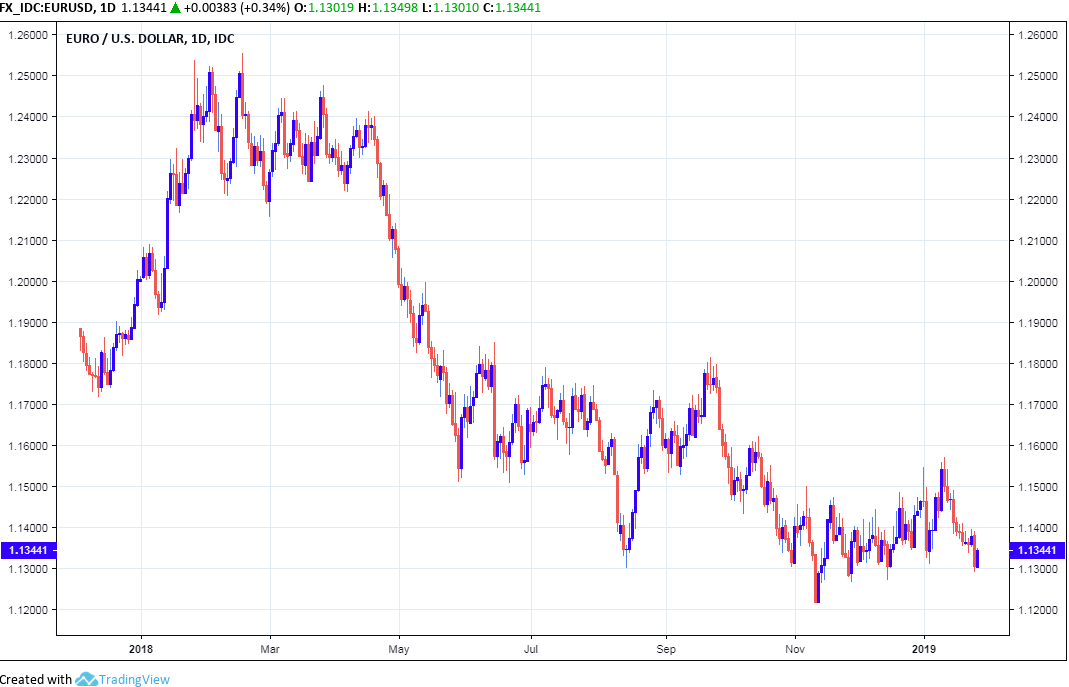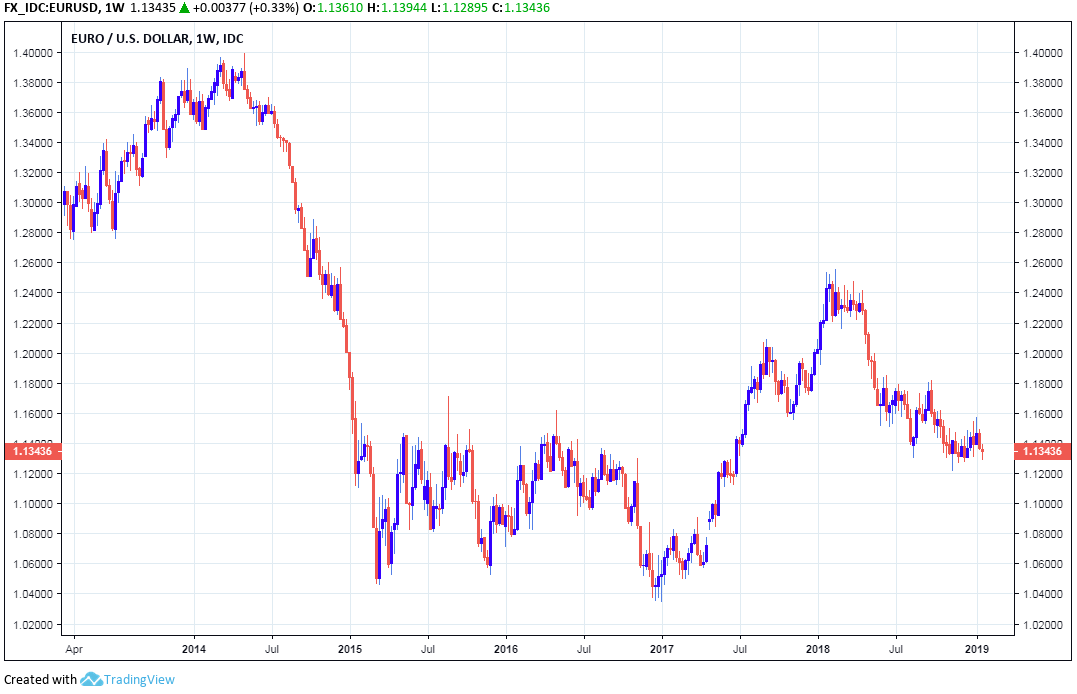"We're positive on EUR/USD" says Bank of America
- Written by: James Skinner

© European Central Bank
- EURUSD could fall to new lows this year says Bank of America.
- As economy falters and fears for ECB interest rate outlook grow.
- But recovery may not be far behind, should come before year-end.
The Euro is likely to reach new lows over the coming months as Eurozone growth falls falls even further, according to Bank of America Merrill Lynch, but a recovery for the economy and currency may not be far behind those falls.
Eurozone economic data has gone from bad to worse of late, forcing the European Central Bank (ECB) to reconside its earlier interest rate guidance, and the dire news is still coming thick and fast. This is bad for the Euro outlook.
"Our focus now is on the Eurozone data. Further weakness could push EURUSD to 1.10 by mid-year," says Athanasios Vamvakidis, a strategist at Bank of America.
The Ifo Institute of Economic Research said Friday that its latest survey shows a majority of 7,000 firms experiencing a deterioration in current business conditions in January and fearing for the domestic economic outlook.
The survey carries a lot of weight with the market because of its large sample size and the strong correlation its results have with economic growth in Germany and the Eurozone.
"Companies assessed their current business situation slightly less favourably. Their business expectations also deteriorated sharply and turned pessimistic for the first time since December 2012. The German economy is experiencing a downturn," says Clemens Fuest, president of the Ifo Institute.

Above: Euro-to-Dollar rate shown at daily intervals.
Friday's Ifo is just the tip of the iceberg for Germany and the Eurozone because factory output from the bloc's major economies has been falling steadily for months now. IHS Markit data suggested Thursday that both French and German manufacturing sectors are now in recession.
There has been speculation in recent weeks suggesting the entire German economy is teetering on the brink of a recession too, while many say Italy has already gone over the edge. France is also flirting with an economic downturn given civil unrest on the streets.
All of this is weakening the outlook for economic growth and undermining the Eurozones's already-fragile inflation pressures, which led the ECB to hint Thursday that it could delay plans to raise its interest rate from its current record low in the summer, until well into the 2020 year.
"The issue for us is whether we should be talking about a mere delay or a proper cancellation of inflation normalization. If the positives we mentioned above do not materialize, then we would seriously question the possibility for the ECB to hike at all on this side of the cycle," Vamvakidis says.
The ECB needs economic growth to be sufficient enough for it to lift the consumer price index and core inflation back toward the target of "close to but below 2%", if it is to be able to justify raising interest rates. That's what the currency market wants to see.
But core inflation is currently at just 1%, unchanged from it's January 2016 levels and only 0.4% higher than it was in January 2015 when the ECB was planning a record amount of economic stimulus designed to lift consumer prices.
Changes in interest rates are only normally made in response to movements in inflation but impact currencies because of the push and pull impact they have on capital flows. Rising rates are positive for a currency and vice versa.

Above: Euro-to-Dollar rate shown at weekly intervals, covering a multi-year timeframe.
"If we do not observe any rebound soon, this will bring core inflation even below our already pessimistic projections. Besides, if the global economy does not recover by mid-year, contrary to our baseline, then the market pricing of Fed rate cuts will become very likely," Vamvakidis warns." In those circumstances, how could the ECB take the risk of lifting its policy rate, and potentially trigger an overreaction of the EUR, which would weigh even further on consumer price dynamics and growth?"
Vamvakidis says there is a danger the European Central Bank will not be able to raise its interest rate before the next global recession hits, which could then mean it becomes stuck in what would be a semi-permanent crisis mode.
That would be bad for the Euro, particularly as most other G10 central bank interest rates are already much higher than the ECB's -0.30% deposite rate and its 0% refinancing rate. It might even encourage fresh questions about the viability of the single currency.
However, Vamvakidis also says he does not expect the Eurozone's economic woes to go that far. Instead, he forecasts a steady recovery for the bloc's economy over the coming months.
Chinese government efforts to prop up the world's second largest economy, which is creaking beneath the weight of White House tariffs, and an anticipated deal to end the so-called trade war as a major factor could both support growth this year.
The UK parliament's effort to block a complete break with the European Union, a small increase in government spending across some EU countries and lower oil prices are all also reasons for thinking growth could pick up, which would be good for the ECB.
"This is why for now we maintain our call for a first 20 bps deposit rate hike in December 2019, with the alternative not being some point in 2020, but rather a time that is not even within our forecasting horizon," Vamvakidis writes, to clients Friday. "Stabilization and recovery in the data could push EURUSD above 1.15."
The Euro-to-Dollar rate was quoted 0.31% higher at 1.1348 Friday but has declined -1.02% for the 2019 year-to-date. Bank of America forecasts it will recover to 1.25 before year-end, although it also projects the rate will reach 1.20 by the end of March, which now seems unlikely to happen.
Time to move your money? Get 3-5% more currency than your bank would offer by using the services of foreign exchange specialists at RationalFX. A specialist broker can deliver you an exchange rate closer to the real market rate, thereby saving you substantial quantities of currency. Find out more here.





